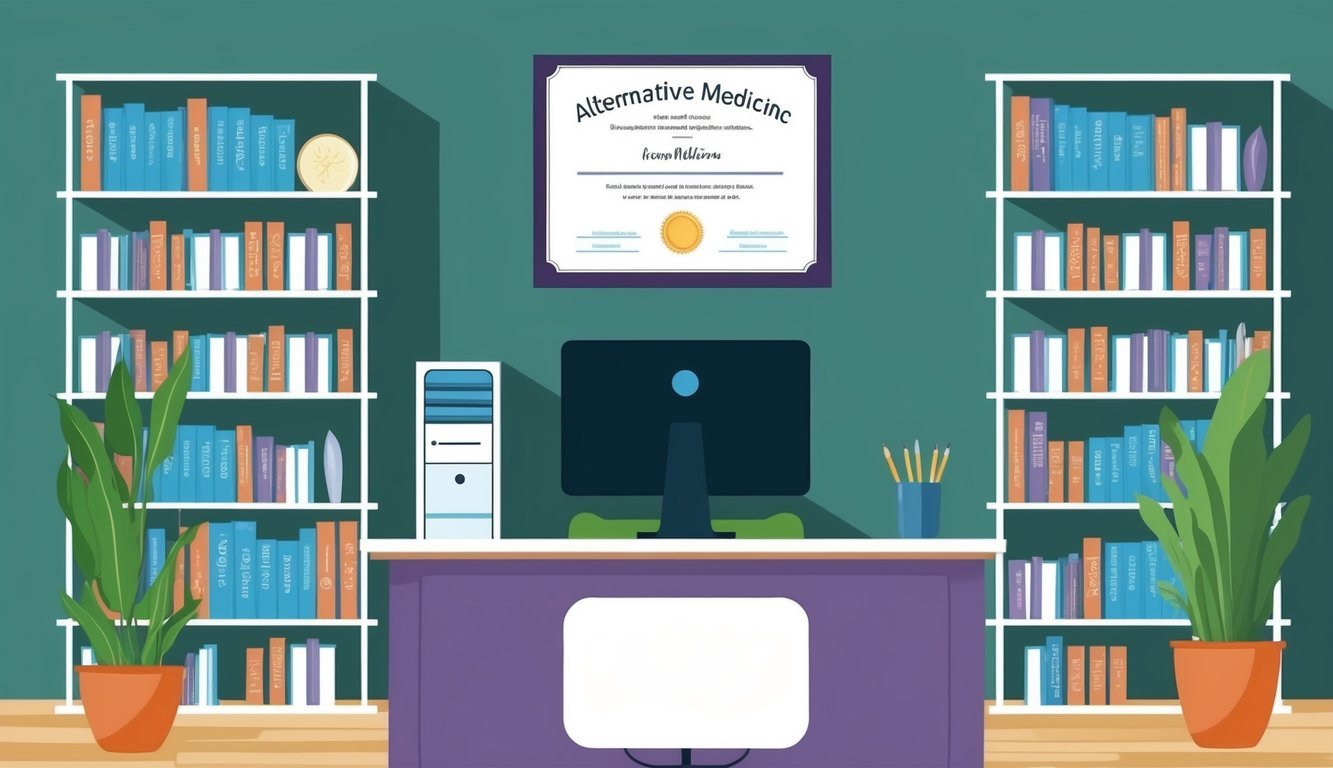Alternative medicine is really catching on these days as folks search for natural pathways to better health.
Blending ancient traditions with modern insights, these practices are gaining traction—and maybe you’ve even considered becoming an alternative medicine practitioner yourself.

If you’re passionate about helping others through natural healing, you’ll need to get the right training.
Fortunately, there are some fantastic programs out there that can pave your way to becoming an alternative medicine practitioner.
Let’s check out some of the top options to help you learn these essential skills.
These schools deliver a solid education in natural healing methods.
1) Traditional Chinese Medicine Program at Pacific College
Hey there! Ready to jump into the fascinating world of Eastern medicine? Pacific College has you covered.
They offer a stellar Master’s degree in acupuncture with a Chinese medicine specialization.
This program is no walk in the park—it’s a four-year journey where you’ll earn 180.5 units and a whopping 3,337.5 credit hours filled with theory and hands-on practice.
Quite a commitment, right?
Here’s the kicker: upon graduation, you’ll be all set to take the California state licensure exam and sit for national certification exams too.
Before you know it, you could be a licensed practitioner!
Pacific College has been at this since 1986, and they’re not just teaching—they’re leading the way in acupuncture and Chinese medicine education.
If you already have a master’s degree, check out their doctorate completion program.
It’s like a cherry on top for your education!
If making a difference in people’s lives through alternative medicine sounds appealing, this program might just be your pathway.
It’s a stellar way to blend age-old wisdom with modern care practices.
2) Ayurvedic Wellness Educator at Kerala Ayurveda Academy

If you’re curious about Ayurveda, Kerala Ayurveda Academy has a fantastic opportunity for you.
Their Ayurvedic Health Counselor (AHC) course is just the ticket for beginners.
This course dives into the essentials of Ayurvedic wellness, covering diet, lifestyle, and natural remedies.
It’ll take around 692 hours to complete, but you can choose between online and in-person classes—very handy for busy folks!
When you finish, you can take a test to become a certified Ayurvedic Health Counselor, recognized by the National Ayurvedic Medical Association.
Want to go deeper? They also offer an Ayurvedic Practitioner program, a more advanced course that digs deeper into Ayurvedic medicine with 900 hours of learning.
With these programs, you’ll be well on your way to helping others improve their health naturally.
And hey, building those valuable skills can lead to all sorts of exciting career opportunities in the healthcare world.
Plus, if you look into top medical transcription programs, you could boost your expertise and support medical professionals even more. It’s all about making a meaningful impact while you pursue a fulfilling career in alternative medicine!
3) Homeopathy Certification at American Institute of Homeopathy

Interested in homeopathy? The American Institute of Homeopathy has the perfect program for you.
They’ve been a cornerstone of homeopathic medicine since 1844, so you can trust that you’re in good hands.
This course teaches you about holistic treatments and how to consider the whole person instead of just the symptoms—pretty cool, right? You’ll start with the basics of homeopathy and gradually tackle more advanced topics, exploring various remedies and their applications, all with hands-on case studies.
Once you wrap up the program, you’re ready to become a Certified Clinical Homeopathic Specialist.
This certification opens up a world of career possibilities in alternative medicine.
The best part? You get to study at your own pace, making it easy to balance with your life.
No need to drop everything else just yet!
Once you’re finished, you’ll join a vibrant community of fellow practitioners, thanks to the connections you’ll build with the American Institute of Homeopathy.
4) Naturopathic Practitioner at Bastyr University
Dreaming of becoming a naturopathic doctor? Bastyr University has an incredible program just for you.
Their Doctor of Naturopathic Medicine course is all about providing a strong foundation in natural healing techniques.
At Bastyr, you’ll explore a wide array of naturopathic modalities—from botanical medicine and nutrition to physical medicine.
Plus, you’ll also learn about conventional medical topics to give you a well-rounded perspective.
This isn’t just about reading textbooks.
You’ll get loads of hands-on experience in Bastyr’s clinics, treating real patients under supervision.
That’s invaluable for your future career!
What’s cool is that Bastyr’s curriculum is systems-based, connecting biomedical and clinical sciences.
This approach helps you get a feel for how various bodily systems interplay and how to treat the whole person.
After graduation, you’ll be prepped for licensing exams and ready to start your practice.
Some of their alumni even return as faculty—how inspiring is that?
5) Herbal Medicine Diploma at Maryland University of Integrative Health
Got a passion for plants and herbal solutions? The Herbal Medicine Diploma from Maryland University of Integrative Health (MUIH) could be just what you’re after.
This program blends the timeless wisdom of herbalism with modern science, teaching you all about different herbs, how they work, and how to use them safely.
At MUIH, you’ll have hands-on opportunities in their herb garden and lab, including the chance to whip up your own herbal remedies.
The coursework covers everything from botany and pharmacology to the clinical skills you’ll need.
You’ll even get insights into running your own herbal business!
MUIH’s instructors are passionate about herbs and eager to share their knowledge, helping you embrace both the art and science of herbal medicine.
Once you’ve completed the program, you could work as an herbalist—whether starting your own practice or finding a spot in health food stores, spas, or wellness centers.
If you love nature and helping people, this could be a fantastic fit for you.
What to Look for in a Program

When it comes to picking an alternative medicine program, there are a few key factors that make a world of difference.
You’ll want to check out the school’s credentials, who’s teaching the classes, and what you’re actually going to learn.
Accreditation
First things first: accreditation is crucial.
It shows that a program meets quality standards.
Look for schools accredited by recognized bodies like the Council on Naturopathic Medical Education.
This way, you know your degree will have some serious weight behind it with employers and institutions.
Accredited programs usually have better resources and more hands-on experience in clinics or labs.
This training is key for your future career.
Another thing to keep in mind is that many states require a degree from an accredited school for licensing.
It’s not just about getting a good education; it’s about securing your future job prospects, too.
Experienced Instructors
Great instructors can really enhance your learning experience.
Search for programs with teachers who have real-world experience in alternative medicine—not just academics.
A little insight can make all the difference.
Check out faculty bios on school websites and look for:
- Years of clinical experience
- Published work in alternative medicine
- Leadership roles in professional organizations
Take Bastyr University, for instance; they’re known for their experienced faculty, with many instructors leading the charge in their fields.
Don’t hesitate to reach out to current students or alumni.
They can provide you with the inside scoop on which instructors are the most engaging and helpful.
Comprehensive Curriculum
A solid program should cover a wide range of topics.
You want to explore various alternative medicine approaches, not just a couple.
Look for courses that touch on:
- Traditional healing systems (like Ayurveda or Chinese medicine)
- Nutrition and herbalism
- Mind-body techniques (like yoga or meditation)
- Basic medical sciences (anatomy, physiology, etc.)
Some places, like CCNM Boucher, blend scientific and holistic approaches, giving you a well-rounded education.
Don’t forget to see if the program offers electives or specializations that match your interests.
Plus, look for those with clinical training or internships because gaining hands-on experience is essential in this field.
Benefits of Alternative Medicine Education

Getting an education in alternative medicine brings a fresh perspective to healthcare.
It opens up new avenues of understanding health and healing.
Holistic Approach to Health
Schools of alternative medicine teach you to consider the whole person.
You’ll dive into the physical, mental, and spiritual aspects of health—almost like seeing the full picture in a beautiful painting.
This body-systems approach helps you treat underlying issues instead of just addressing symptoms.
You’ll see how diet, lifestyle, and prevention become pivotal in your toolkit.
This kind of education encourages you to think outside the box, enabling you to offer patients more healing options.
Diverse Career Opportunities
With alternative medicine training, the career possibilities really open up.
You could end up working in a clinic, launching your own practice, or joining a wellness center.
Some graduates choose to become holistic health practitioners, while others go into teaching or research.
You might even find a spot in a spa or fitness center.
Demand for these skills is on the rise as more folks seek out natural health options.
You could specialize in areas like nutrition, herbalism, or energy healing.
The best part? Your creativity can really shine as you mix different methods to help people feel better.
Frequently Asked Questions

Alternative medicine programs present a wealth of options for anyone looking to break into holistic health careers.
Here’s a quick look at some common questions regarding studying and working in alternative medicine.
Which accredited programs are recognized for holistic health degrees?
Several schools feature accredited programs in naturopathic medicine.
These include degrees from colleges approved by the U.S. Department of Education, along with programs accredited by the Council on Naturopathic Medical Education in North America.
What kind of careers can I pursue with a degree in alternative medicine?
Your degree in alternative medicine can lead to various exciting career paths.
You might think about becoming an acupuncturist, herbalist, naturopathic doctor, or even a massage therapist.
These fields are expanding as people increasingly seek holistic health solutions.
Can you recommend some top schools for holistic medicine studies?
Some of the standout schools for holistic medicine include Bastyr University, Pacific College, and Maryland University of Integrative Health.
They offer robust programs in naturopathy, Chinese medicine, and herbal studies.
What are the different types of complementary and alternative medicine available?
You’ll find several common types of alternative medicine, including acupuncture, herbal medicine, homeopathy, and naturopathy.
The list also includes practices like Ayurveda, chiropractic care, and meditation.
How does one become a qualified naturopathic doctor?
To become a naturopathic doctor, it’s essential to complete a four-year program at an accredited naturopathic medical school.
After graduation, you’ll need to pass licensing exams and meet state requirements to practice.
What are the main categories of complementary and alternative medicine practices?
The main categories of alternative medicine include natural products, mind-body practices, and whole medical systems.
Natural products cover herbs and supplements, while mind-body practices include yoga and meditation.
Whole systems—like Traditional Chinese Medicine and Ayurveda—use multiple approaches to improve health.

